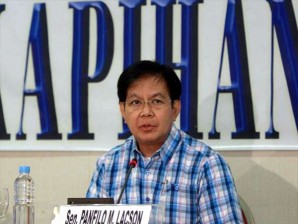
Panfilo Lacson, former head of the Philippine National Police, worked at the notorious Metropolitan Command Intelligence and Security Group from 1971 until the fall of Ferdinand Marcos in 1986.
A lawyers’ group on Saturday assailed a Supreme Court decision reversing a lower court’s award of damages to alleged torture victims of the late General Fabian Ver, then Lieutenant Colonel Panfilo Lacson and other ex-Marcos military officers.
The high court recently upheld a 2003 Court of Appeals ruling reversing the Quezon City Regional Trial Court’s finding that Ver, Lacson (now a senator) and others should pay damages to suspected subversives they had allegedly arrested and tortured. It said the RTC’s decision lacked “procedural due process.”
The National Union of People’s Lawyers (NUPL) said it was “appalled” by the Supreme Court ruling that put a premium on technicalities, adding that this was “a setback for all human rights victims who have been fighting for justice.”
In bad faith
NUPL secretary general Edre Olalia denounced the decision for “anchoring merely on the technicalities of procedure … devoid of any social context that has often aided in the perpetuation of impunity.” He said the latest decision “fails to appreciate the peculiar circumstances with which the victims brought their legitimate grievances to court.”
Olalia added that the respondents “may have been in bad faith when they deliberately failed to show up at the proceedings.”
But the Supreme Court said that Lacson and Ver, together with Colonels Fidel Singson, Rolando Abadilla, Gerardo Lantoria and Galileo Kintanar, Major Rodolfo Aguinaldo, First Lieutenant Pedro Tango and Master Sergeant Bienvenido Balaba, were deprived of due process when they were ordered to pay damages without a chance to air their side.
Lacson, former head of the Philippine National Police, worked at the notorious Metropolitan Command Intelligence and Security Group from 1971 until the fall of Ferdinand Marcos in 1986.
The petitioners—Rogelio Aberca, Rodolfo Benosa, Nestor Bodino, Noel Etabag, Danilo de la Fuente and 14 others—said they were victims of illegal searches and seizures by the military’s intelligence units in 1982.
The appellate court had ruled that the petitioners had failed to follow the RTC’s 1990 order that they report the addresses of the respondents for proper notification.
Case dismissed and reversed
The lower court dismissed the case, but reversed it a year later, allowing the petitioners to serve the notice on Lacson and his coaccused by publishing it in a national daily.
Lacson and the other living respondents failed to answer the complaint for damages and were declared in default, allowing the petitioners to submit evidence.
Ruling on the available evidence, the court ordered the respondents to pay the petitioners P350,000 each in damages.
The case was elevated to the Court of Appeals.
The case dragged on for almost three decades.
Olalia lamented that the victims spent a considerable amount of time and resources “so that no one may violate their rights with impunity only to bang into a wall of technicalities.”